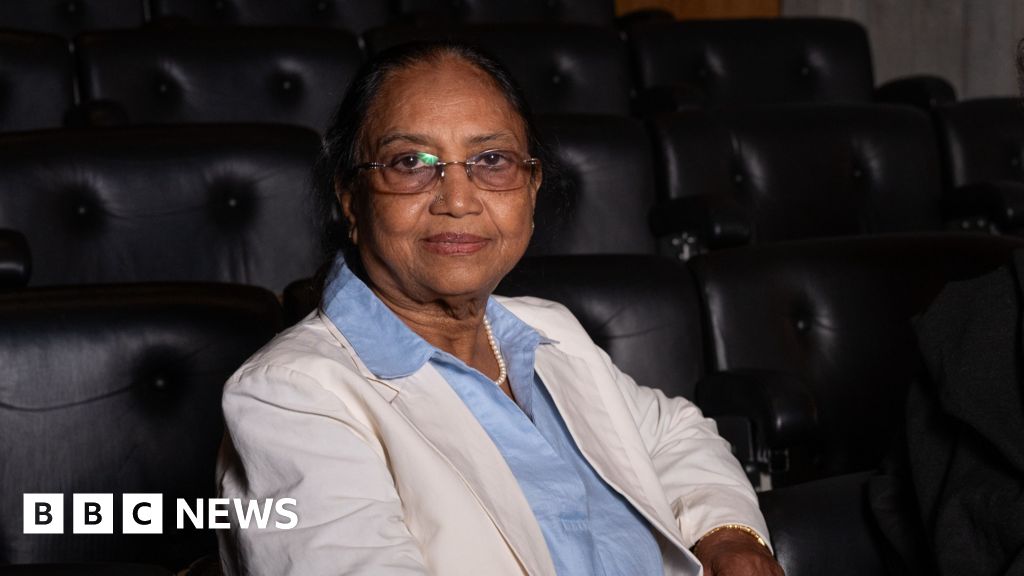Indian writer-lawyer-activist Banu Mushtaq has scripted historical past by successful the International Booker prize for the brief story anthology, Heart Lamp.
It is the primary e book written within the Kannada language, which is spoken within the southern Indian state of Karnataka, to win the distinguished prize.
The tales in Heart Lamp have been translated into English by Deepa Bhasthi.
Featuring 12 brief tales written by Mushtaq over three many years from 1990 to 2023, Heart Lamp poignantly captures the hardships of Muslim ladies dwelling in southern India.
Mushtaq’s win comes off the again of Geetanjali Shree’s Tomb of Sand – translated from Hindi by Daisy Rockwell – successful the prize in 2022.
Her physique of labor is well-known amongst e book lovers, however the Booker International win has shone a much bigger highlight on her life and literary oeuvre, which mirrors lots of the challenges the ladies in her tales face, introduced on by spiritual conservatism and a deeply patriarchal society.
It is that this self-awareness that has, maybe, helped Mushtaq craft among the most nuanced characters and plot-lines.
“In a literary tradition that rewards spectacle, Heart Lamp insists on the worth of consideration — to lives lived on the edges, to unnoticed decisions, to the power it takes merely to persist. That is Banu Mushtaq’s quiet energy,” a review within the Indian Express newspaper says in regards to the e book.
Mushtaq grew up in a small city within the southern state of Karnataka in a Muslim neighbourhood and like most ladies round her, studied the Quran within the Urdu language at college.
But her father, a authorities worker, needed extra for her and on the age of eight, enrolled her in a convent college the place the medium of instruction was the state’s official language – Kannada.
Mushtaq labored exhausting to change into fluent in Kannada, however this alien tongue would change into the language she selected for her literary expression.
She started writing whereas nonetheless in class and selected to go to varsity whilst her friends have been getting married and elevating kids.
It would take a number of years earlier than Mushtaq was printed and it occurred throughout a very difficult part in her life.
Her brief story appeared in an area journal a 12 months after she had married a person of her selecting on the age of 26, however her early marital years have been additionally marked by battle and strife – one thing she brazenly spoke of, in a number of interviews.
In an interview with Vogue journal, she stated, “I had all the time needed to jot down however had nothing to jot down (about) as a result of instantly, after a love marriage, I used to be advised to put on a burqa and dedicate myself to home work. I turned a mom affected by postpartum despair at 29”.
In the one other interview to The Week journal, she spoke of how she was pressured to reside a life confined throughout the 4 partitions of her home.
Then, a stunning act of defiance set her free.
“Once, in a match of despair, I poured white petrol on myself, desiring to set myself on fireplace. Thankfully, he [the husband] sensed it in time, hugged me, and took away the matchbox. He pleaded with me, inserting our child at my toes saying, ‘Don’t abandon us’,” she advised the journal.
In Heart Lamp, her feminine characters mirror this spirit of resistance and resilience.
“In mainstream Indian literature, Muslim ladies are sometimes flattened into metaphors — silent victims or tropes in another person’s ethical argument. Mushtaq refuses each. Her characters endure, negotiate, and infrequently push again — not in ways in which declare headlines, however in ways in which matter to their lives,” in response to a review of the e book in The Indian Express newspaper.
Mushtaq went on to work as a reporter in a distinguished native tabloid and likewise related to the Bandaya motion – which focussed on addressing social and financial injustices by way of literature and activism.
After leaving journalism a decade later, she took up work as a lawyer to assist her household.
In a storied profession spanning a number of many years, she has printed a copious quantity of labor; together with six brief story collections, an essay assortment and a novel.
But her incisive writing has additionally made her a goal of hate.
In an interview to The Hindu newspaper, she spoke about how within the 12 months 2000, she obtained threatening telephone calls after she expressed her opinion supporting ladies’s proper to supply prayer in mosques.
A fatwa – a authorized ruling as per Islamic regulation – was issued in opposition to her and a person tried to assault her with a knife earlier than he was overpowered by her husband.
But these incidents didn’t faze Mushtaq, who continued to jot down with fierce honesty.
“I’ve constantly challenged chauvinistic spiritual interpretations. These points are central to my writing even now. Society has modified rather a lot, however the core points stay the identical. Even although the context evolves, the fundamental struggles of girls and marginalised communities proceed,” she told The Week journal.
Over the years Mushtaq’s writings have received quite a few prestigious native and nationwide awards together with the Karnataka Sahitya Academy Award and the Daana Chintamani Attimabbe Award.
In 2024, the translated English compilation of Mushtaq’s 5 brief story collections printed between 1990 and 2012 – Haseena and Other Stories – received the PEN Translation Prize.
#Heart #Lamp #Banu #Mushtaq #scripts #historical past #International #Booker #Prize #win
newest information right this moment, information right this moment, breaking information, newest information right this moment, english information, web information, high information, oxbig, oxbig information, oxbig information community, oxbig information right this moment, information by oxbig, oxbig media, oxbig community, oxbig information media
HINDI NEWS
News Source


